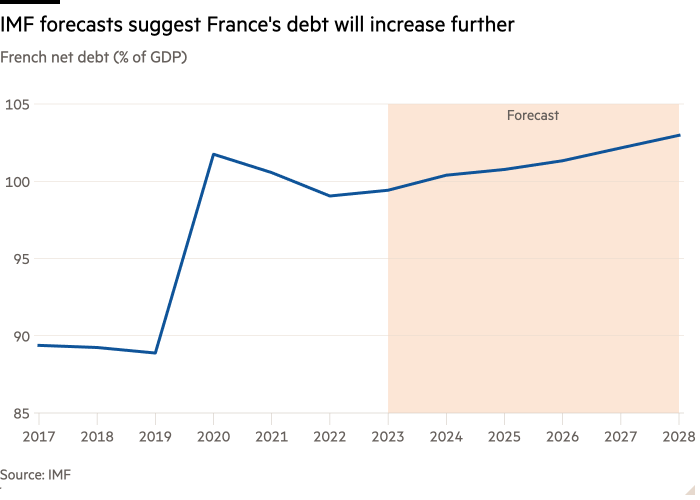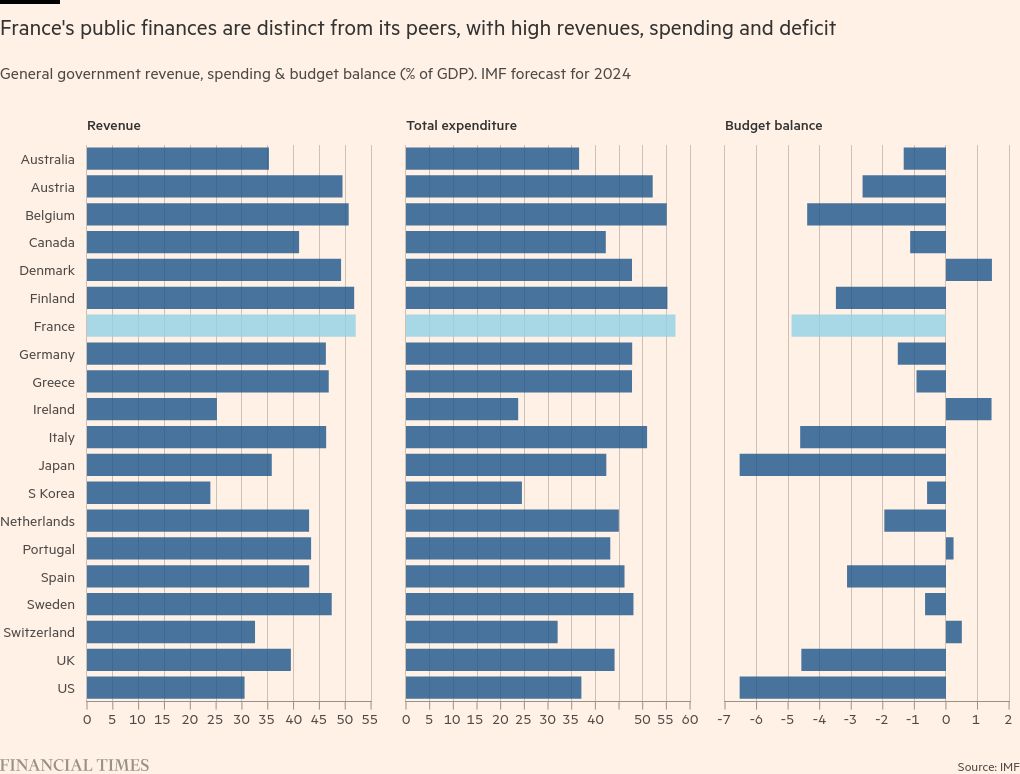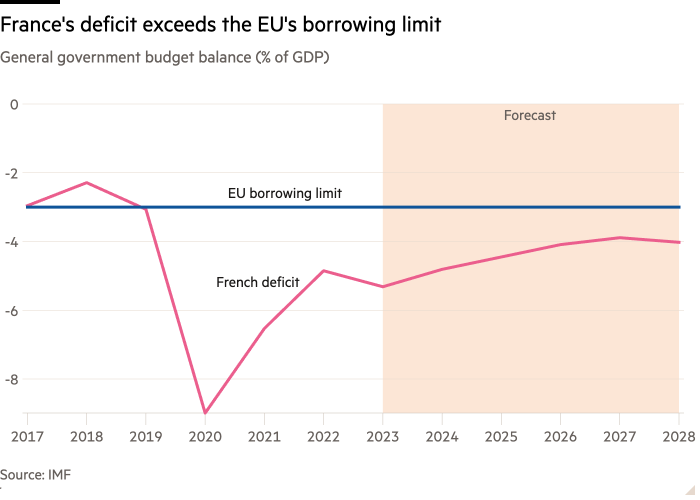France’s far-right and far-left parties have for years made generous spending promises in response to public grievances against President Emmanuel Macron and his centrist government.
They could now come first and second in snap National Assembly elections on June 30 and July 7, with Macron’s alliance coming in a distant third, according to opinion polls.
The possibility of a far-right National Rally (RN) government, the victory of the left-wing alliance of the New Popular Front (NFP) or the most likely scenario of a hung parliament full of fiscal populists have shaken investors, business leaders and France’s European partners.

What does the far right promise?
“Will the next government compromise or will it go crazy? If they go crazy. . . so it’s a massive crash,” said Silvia Ardagna, chief economist for Europe at Barclays.
Marine Le Pen fought through the 2022 presidential election promising spending that would have cost more than €100 billion (all figures are annual), primarily to ease the cost of living crisis. His party, the RN, has not yet published a formal program, although it says it will confirm its priorities as election day approaches.
Jordan Bardella, the party’s president and candidate for prime minister, has used this ambiguity to water down some of the RN’s promises in recent days – and combat Macron’s argument that he would plunge France into a debt crisis. But even the measures he plans to maintain would leave a huge budget hole.
Bardella says one of the priorities is to reduce the value-added tax on energy and fuels, estimated to cost between 10 and 17 billion euros – a measure that would require approval from Brussels. But on Monday he delayed his earlier pledge to scrap VAT on essential goods.
Bardella also said he would repeal Macron’s hard-won pension reforms and reduce the retirement age from 64 to 62 at an unspecified time, starting “in the fall.” This should generate a hole of 12 to 13 billion euros, said Éric Heyer, director of the independent economic organization OFCE. The RN wants to further lower the retirement age to 60 for those who have worked at least 40 years – a measure which Bardella said would cost 1.6 billion euros.
The leader of the RN has committed to first carrying out an independent audit upon coming to power before taking other costly measures. “We’re going to find a lot of skeletons in the closet,” he said.
How would the RN finance its projects?
The RN’s ideas are either implausible or on a small scale, economists believe. The party claims it would cut France’s contribution to the EU budget by 2 billion euros – but if it tried to do so, Brussels could limit the EU funds Paris receives.
The RN has previously said it would save 9 billion euros by reducing immigration and reducing social benefits and healthcare for foreign nationals.
One of the tax measures identified is to end tax breaks granted to shipping companies, including French giant CMA CGM. These represented 5.6 billion euros last year, but this amount was based on record turnover during the Covid-19 pandemic and rose to 3.8 billion euros in 2022.
The RN also said it could save 15 billion euros by fighting fraud. But Heyer said that policy was too vague: “When they say they’re going to fight fraud to fund their program, it shows they have no idea how to fund it.”
Bardella acknowledged that RN still has work to do, saying recently, “We are in the process of identifying possible savings in wasteful government spending.”

What are the plans of the left-wing NFP bloc?
The NFP has a radical tax and spending program heavily inspired by the far-left populist party La France Insoumise (also known as La France Unbowed or LFI).
Valérie Rabault, a socialist NFP candidate and former French budget rapporteur, told business daily Les Echos that the program would cost a total of 106 billion euros. Some members of LFI even believe that this estimate is too low.
The NFP has pledged to increase public sector wages, with Macron’s alliance estimating the measure would cost €20 billion. Like the RN, the NFP would reduce the retirement age to 62, even if some on the far left want to push it to 60.
It would also aim to raise the minimum pension to the same level as the minimum wage, a project estimated at 25 billion euros, according to LFI figures shared with the Institut Montaigne think tank two years ago.
The left would also finance 500,000 nursery places at a cost of 28.5 billion euros over five years, according to the Montaigne Institute, while subsidizing energy and increasing spending on culture and sport.
How can the left finance its spending plans?
Taxes and more taxes. Unlike the RN, he at least proposed several revenue ideas to finance his projects. It would restore and increase the wealth tax, increase inheritance taxes, reimpose an exit tax on wealthy individuals who move their tax residence outside of France and increase income tax and social security contributions for higher earners. . It would also eliminate some tax breaks and tax credits for businesses.
Manon Aubry, a far-left MEP and senior member of the NFP, said the group’s “budget would be balanced by the end of the legislature.”
But can crushing the rich really fund such a program? If Macron had not changed the wealth tax in 2018, it would have collected only 6 billion euros last year, according to a government study.
Anne-Laure Delatte, of the National Council for Scientific Research, which supports the NFP in its economic policy, said a much more progressive wealth tax – at 0.5 percent on fortunes above 5 million euros, rising to 3 percent above a billion euros – could raise 15 to 30 billion euros per year. In total, his team estimates that various tax increases could bring in between 54 and 95 billion euros.
“Half of the deterioration in the French deficit since 2017 is due to unprecedented tax cuts through increased spending,” Delatte said.
But the share of taxes in GDP in France is already higher than anywhere else in the OECD and the left’s agenda risks shaking business confidence and undermining the economy.
How does this compare to Macron’s plans?
Both the far right and far left are promising a radical break with Macron’s pro-business agenda, while blaming him and his government for a deficit that has soared to 5.5 percent.

Macron’s centrist alliance has pledged to make some minor gifts to ease pressure on the cost of living, but it is sticking to its pledge not to raise taxes. His campaign message is that he is the only fiscally responsible party.
Before the snap election, the government hoped to make an additional €10 billion in savings this year, after cuts of €10 billion were announced in January. He said he would need to find at least 20 billion euros next year.
“The left would cause capital flight and the far right would cause a debt crisis,” said Ludovic Subran, chief economist at Allianz. “And a technocratic government (in a parliament without a majority), a bit of both. The French risk premium may not decline any time soon.”